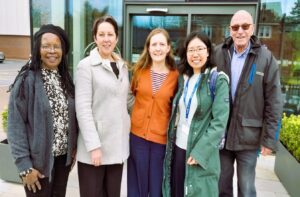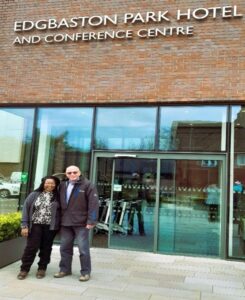25 April 2024

By Naomi Muigua
Social Care Involvement Officer, Stakeholder Engagement Team, Innovation and Partnerships Division, Adult Social Care and Health, Kent County Council
In April, I had pleasure of attending the 15th National Institute of Health and Care (NIHR) School for Social Care Research annual conference in Birmingham. The conference brings together a broad coalition of adult social care experts, made up of researchers, policymakers, managers, commissioners, providers, service users, carers, and practitioners. I was privileged to attend the conference with colleagues from the Kent Research Partnership, including:
- Professor Ann-Marie Towers, Social Care Theme Lead
- Dr Wenjing Zang, Research Fellow, Centre for Health Services Studies (CHSS), University of Kent; Researcher in Residence, Kent Research Partnership
- Lilly Trapp, Research Facilitator, Kent Research Partnership, Adult Social Care & Health, Kent County Council
- John Potts, Co-lead of Lived Experience Working Group and lay co-applicant

Why adult social care research is important.
The aim of the conference was to offer a space for this community to discuss research and practice in the field, highlight recent and ongoing studies and establish future research and strategic priorities. Research into Adult Social Care is significant, for so many reasons. The conference highlighted how research:
- Assists the integration of health and social care.
- Impacts the standard of care and support provision and provides evidence to improve the safety of people receiving social care.
- Highlights the needs and experiences of social care service users and their informal carers.
- Aids the development of the social care workforce.
- Acts a guide for service users, regarding choice, control, and quality.
- Shapes the future funding and organisation of social care.
The two-day agenda (available here) covered a wide range of topics. As a social care professional, I was interested to see how relevant so many of the projects were to our day-to-day work. I attended a range of informative, practice-focused sessions over the two-days including:
- Seeing and valuing social work with older people.
- Mapping models: approaches to mental health social care assessments in the UK.
- Decluttering the homes of people with hoarding behaviours: Local authority commissioning, professional practices, and user experiences.
- From research to practice: developing and evaluating the Feeling at Home resources.
- Dementia and Mild Cognitive impairment in prison care pathway: The development of the logic model and intervention delivery platform
- An overview of the role of Dementia Champions in homecare
- Use of ICT by carers of people living with dementia
- Research with marginalised/ minoritised communities.
- Reflections on effective involvement and participation in research.
- Working in partnership with research and practice
- Supporting social inclusion for people with serious mental illness living in supported housing
- Addressing multiple exclusion homelessness in social work education
- Reimagining day care for older adults: what role can it play in policy and practice.
- How is the quality and suitability of older people’s housing related to their care use?
- Developing a resource to support localities address user and family understanding of, and engagement with reablement: a development and implementation study.
Why we need inclusive engagement in Adult Social Care Research
Throughout the conference, speakers repeatedly stressed the significance of Adult Social care research being built by a diverse set of experiences. This innovative approach to seeking input from key stakeholders in the social care community was evident throughout the conference, which featured a dedicated sessions for service users and informal carers and multiple sessions involving health and social care professionals with research interests.

One of the best aspects of attending the conference was being able to discuss and learn about Adult Social Care from such a broad range of voices.
So, if you have an opportunity and would like to share your expertise, I recommend attending next year’s conference NIHR School for Social Care Research’s annual conference.
For any questions about getting involved in research opportunities in Kent, please contact KentResearchPartnership@kent.ac.uk